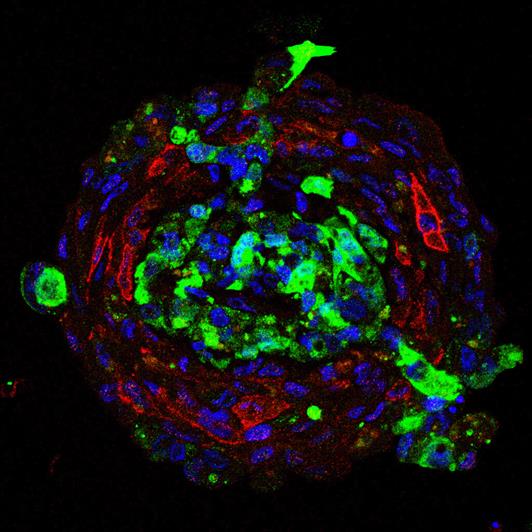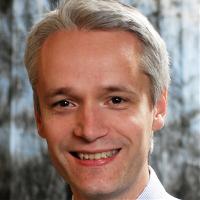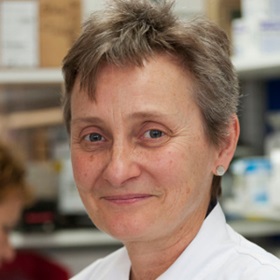
Image: 3D tumour spheroids of an aggressive soft tissue sarcoma
Sarcomas occur all around the body in the bones, or in the soft tissues such as muscle, fat and blood vessels. They are hard to understand and treat. This is partly because there are around 100 different types which are biologically complex, researchers have fewer patients to study and funding is scarce. Sarcomas are also often diagnosed late, and patients have few treatment options meaning survival rates are poor. In over half of these patients, the disease spreads to other organs, at which point it is incurable. Many of the drugs prescribed today are the same as those approved decades ago and clinicians have had limited success with a ‘one-size-fits-all’ approach using chemotherapy. Sarcoma patients need more personalised treatments, tailored more closely to their individual tumours.
Our scientists are finding innovative ways to tackle the scientific, clinical and financial challenges of researching sarcomas. They are drawing from the expertise of their colleagues and building connections with other sarcoma researchers around the world. These networks are enabling them to recruit patients for clinical trials and pool resources like data, tissue samples and funding in ways that simply wouldn’t have been possible separately.
Rising to the challenge
 One of the researchers leading the way is Dr Paul Huang, Leader of the Molecular and Systems Oncology Team. Dr Huang’s team characterises sarcomas on the basis of their molecular and genetic features to understand why patients respond differently to treatment and to identify new options for treatments.
One of the researchers leading the way is Dr Paul Huang, Leader of the Molecular and Systems Oncology Team. Dr Huang’s team characterises sarcomas on the basis of their molecular and genetic features to understand why patients respond differently to treatment and to identify new options for treatments.
Dr Huang’s team are searching for new biomarkers – biological features within our cells that can be measured and used to better understand individual cancers. Biomarkers can indicate whether a patient is likely to respond to a treatment, or how well a treatment is working for a patient. Dr Huang has recently identified a selection of biomarkers – a biomarker panel – that could be used to identify treatments for several types of sarcoma.
Dr Huang says: “There is so much that is still unknown about sarcomas compared to more common cancers. This can be daunting, but as a scientist it’s also very exciting because our research could unlock the underlying biology, which could then help us to identify new treatments.”
People with cancers of unmet need urgently require new treatment options to help them survive their disease. Improving the outlook for these patients is one of our key fundraising priorities.
A ‘symbiotic’ partnership
 To connect his lab to the clinic, Dr Huang works closely with Professor Robin Jones, Head of the Sarcoma Unit at The Royal Marsden NHS Foundation Trust, and Team Leader in Sarcoma Clinical Trials at the ICR.
To connect his lab to the clinic, Dr Huang works closely with Professor Robin Jones, Head of the Sarcoma Unit at The Royal Marsden NHS Foundation Trust, and Team Leader in Sarcoma Clinical Trials at the ICR.
They describe their partnership as ‘symbiotic’. Professor Jones’ insights on clinical questions inform Dr Huang’s lab work. The two work closely together to identify new biomarkers, establish new clinical trials and develop new treatments. They draw on each other’s complementary knowledge, connections to pharmaceutical companies and links with other sarcoma researchers to advance their work.
Their partnership has helped lead to the development of a new Joint Sarcoma Research Centre at the ICR and The Royal Marsden. Professor Jones is co-Director alongside the ICR’s Professor Janet Shipley, who leads on childhood sarcoma research.
Encompassing all sarcoma-related research across the two organisations, the centre is one of the largest sarcoma research centres in Europe, and uniquely collaborative around this collection of cancers. The centre aims to build an international digital hub of clinical and research data on sarcomas. New collaborations have allowed the centre to source tissue donations and host visiting research fellows from around the world.
A key focus for the centre is the use of artificial intelligence to find targets for new drugs, and to predict how patients will respond to particular treatments. By analysing data across multiple sarcomas, it is also possible to find treatments that could work for several different types.
Future ambitions
Dr Huang is now working to develop tests that could help predict how individual patients will respond to treatments and identify new therapies that may be better tailored to their age, sarcoma site and genetic profile.
Our scientists have made great strides: they have identified biomarkers for better selection of targeted therapies, developed drugs from first in human studies through to larger later phase trials, and built networks to unite the international research community. Sarcoma research has lagged behind other cancers for decades and more support is needed to accelerate discoveries, to help transform the lives of sarcoma patients sooner.
Philanthropy plays a key role in pushing forward our vital research into cancers of unmet need, like sarcoma. Find out how you can help us make a difference to patients’ lives:
Support our work
